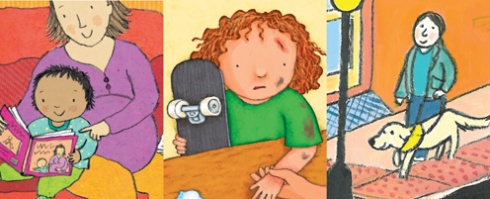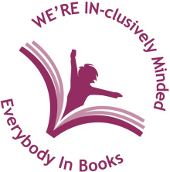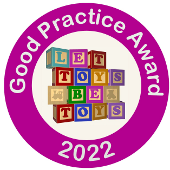
Diversity and Equality
Child's Play aims to reflect the diverse society in which we live and challenge stereotypes. Diversity does not simply refer to heritage
and disability, but also gender, nationality and culture, sexual orientation and age. Inclusive images are casual and incidental, meaning that all children are included as part of the landscape, rather than singled out
for special attention.
Seeing inclusive images is important so that everyone perceives themselves as equal. Inclusion in books allows readers to become familiar with characters that may seem slightly different to them; look or behave slightly differently, or have a different kind of family, but are fundamentally just the same.
We are the products of our own experiences, and as adults we are often unaware of our biases - the beliefs and attitudes that we hold and have acquired from our families, our education and the communities we grew
up in. Without realising it, we can unintentionally perpetuate these beliefs and attitudes in the learning environments we create for children.
Anne O'Connor, Early Years Consultant
Equality & Diversity Part 1, Nursery World, 23rd September 2009
Child's Play works in liaison with a number of agencies and diversity specialists to ensure that inclusion is accurate and effective,
and to avoid tokenism.
Inclusive resources are a requirement in educational settings as outlined in various guidance materials:
Will every child see aspects of their...disability...reflected in the environment?
Participation and Belonging in Early Years Settings
Early Childhood Forum Inclusion leaflet: Participation and Belonging
in Early Years Settings. Inclusion: Working Towards Equality
Pictures, equipment and resources reflect disabled people's lives as part of
a wide representation of children's differing backgrounds and experiences.
All of Us: Inclusion Checklist for Settings
Element of the KIDSactive Playwork Inclusion Project delivered
under contract between KIDSactive and the DfES SureStart unit.
Inclusion is not optional: children have defined entitlements in this area
and settings have legal responsibilities.
Effective Practice: Inclusive Practice, EYFS
Help children to learn positive attitudes and challenge negative attitudes and stereotypes, e.g. using puppets, Persona Dolls, stories and books showing black heroes, disabled kings or queens or families with same sex parents, having a visit from a male midwife or female firefighter.
Provide books and resources which represent children's diverse backgrounds and which avoid negative stereotypes.
Development Matters in the Early Years Foundation Stage
For full details download the Diversity and Equality in the Child's Play Programme Leaflet

 Go to USA site
Go to USA site Go to AUS site
Go to AUS site


Email this page to a friend